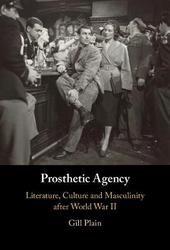
|
Prosthetic Agency: Literature, Culture and Masculinity after World War II
Hardback
Main Details
| Title |
Prosthetic Agency: Literature, Culture and Masculinity after World War II
|
| Authors and Contributors |
By (author) Gill Plain
|
| Physical Properties |
|
| Category/Genre | Literary studies - from c 1900 - |
|---|
| ISBN/Barcode |
9781316513200
|
| Classifications | Dewey:155.33209410 |
|---|
| Audience | |
|---|
| Illustrations |
Worked examples or Exercises
|
|
Publishing Details |
| Publisher |
Cambridge University Press
|
| Imprint |
Cambridge University Press
|
| NZ Release Date |
30 June 2023 |
| Publication Country |
United Kingdom
|
Description
Prosthetic Agency: Literature, Culture and Masculinity after World War II focuses on the social and psychic upheaval of demobilisation. It maps the rapid transition from wartime regimentation to individual responsibility, from intense homosociality to heteronormative expectations, from normativity to disability and from uniformed masculinity to domestic citizenship. This book considers some of the many ways in which popular culture of the time sought to mediate these difficult transitions, exploring films, popular fiction, memoir and biography. In particular, the book explores how technology was imagined as a new space of masculine becoming and how disability was written, represented and assimilated. Through a focus on popular narrative, this book explores the modes of masculinity promoted as ideally suited to national reconstruction and tries to make sense of a culture of rehabilitation that could not name or know itself as such.
Author Biography
Gill Plain is Professor of English at the University of St Andrews and has published extensively on war writing, mid-century British literature and film, popular culture and gender. Her books include Twentieth-Century Crime Fiction (2001), John Mills and British Cinema (2006), Literature of the 1940s: War, Postwar and 'Peace' (2013) and, as editor, British Literature in Transition, 1940-1960 (2018).
ReviewsProsthetic Agency bursts with insight. To call this book a tour de force would be to understate its accomplishment. From the smallest detail to the largest structural organization, the argument about the prosthetic nature of masculinity after the Second World War is handled with magisterial perceptiveness. Gill Plain dextrously weaves together examples from literature and film, and her analysis is all the more valuable for its comprehensive engagement with both media in the 1940s and 1950s. Prosthetic Agency sets a new standard for writing about war, recovery, and masculinity in British studies. Allan Hepburn, McGill University
|